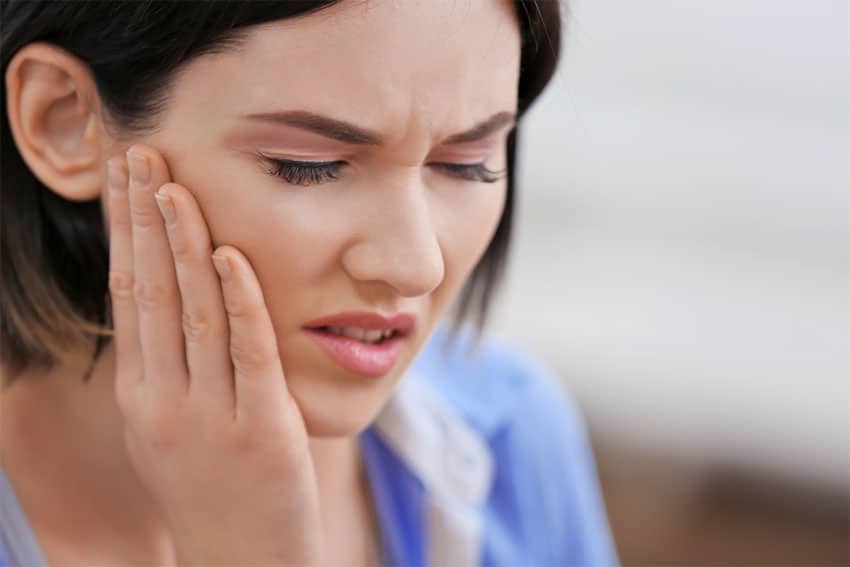People who experience tinnitus often experience multiple psychological effects. Depression is common for people who have the condition, and many people feel experience anxiety as a result of their hearing problems. Tinnitus can be very stressful.
But other times, it’s the stress that leads to tinnitus. Around half of tinnitus sufferers say their tinnitus worsens during periods of high stress.
This could actually be a good sign. When stress triggers tinnitus, temporomandibular joint disorder (TMJ) could be the root cause of ringing in the ears. TMJ is treatable–and TMJ treatment can reduce or eliminate associated tinnitus.
The Link between Tinnitus and TMJ
It might seem like the jaw and the ear are merely close together, but there’s nothing “merely” about the relationship between these two systems.
Physical proximity leads to the functional overlap. For example, consider that molar mike technology the military wants to develop to allow communication using a device attached to the tooth. This device transmits sound to the ear by vibrating teeth, then the vibrations travel to the ear via the bones that connect them. The inner ear is actually housed in the temporal bone, which, yes, is part of the temporomandibular joint (the other part is the mandible, the jawbone). This means that vibrations and pressure changes in the jaw have a very direct route to becoming sounds in your ear.
So, what does TMJ tinnitus sound like? It sounds like a high pitched ringing sound or even a hissing, roaring, clicking, or buzzing sound. The ringing might change as you open or close your jaw.
But that’s not the only connection. Two of the bones in our inner ear–the incus or “anvil” and the malleus or “hammer” are derived evolutionarily from reptilian jawbones. They still retain some of their muscle and nerve connections with the jaw, which can easily cause jaw problems to lead to ear problems.
So it’s not a surprise that most people with TMJ actually experience tinnitus. People with TMJ are about three times as likely to have tinnitus than people without, and if you have TMJ and headaches, you’re six times more likely to have tinnitus.
Stress Aggravates TMJ
So if there is a link between TMJ and tinnitus, it’s easy to see how this leads stress to worsen your tinnitus. It’s common for patients with TMJ to clench their teeth when feeling stressed.
This stresses the jawbone and puts pressure on the teeth and jaw joints. Not only that, but it tenses the jaw muscles, and that tension might be the real source of the TMJ tinnitus. The type of TMJ that’s most strongly linked to tinnitus is muscle tension causing jaw and face pain, so it makes sense that stress would amp up related TMJ.
Practicing yoga, relaxation therapy, meditation, and other stress-reducing activities can help reduce your TMJ and tinnitus symptoms.
Is Your Tinnitus Linked to TMJ?
But your big question is probably: but what about me? Is my tinnitus linked to TMJ? The first sign your TMJ has a link to tinnitus is if it gets worse when you’re stressed.
In addition, watch for other TMJ symptoms, like:
- Jaw pain
- Headaches
- Tooth wear
- Neck pain
If you have these symptoms, then you should suspect TMJ.
And, as we’ve noted above, tinnitus is very common in people with TMJ. In some studies, more than 90% of tinnitus cases had links to muscle face pain, including TMJ. That means getting tested for TMJ is a good idea if you have tinnitus.
<h2″>Can TMJ Treatment Cure Tinnitus?
Yes! With the right TMJ treatment, you can reduce or eliminate TMJ tinnitus. Once we help alleviate stress to the TM joint, it’s very likely your tinnitus will go away. According to studies from the past 50 years, 69% of patients see a noticeable improvement in their tinnitus with TMJ treatment.
If you are looking for a TMJ dentist in Spokane who can treat your TMJ and tinnitus, please call 509-532-1111 today for an appointment with a neuromuscular dentist at Collins Dentistry & Aesthetics.




